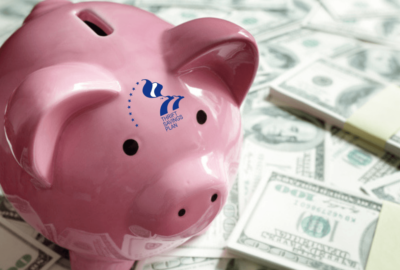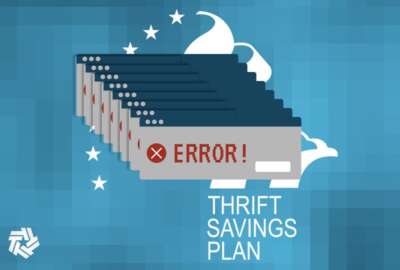
The maximum TSP contributions are going up next year. Should you bite?
Federal law will raise the maximum amounts Americans can contribute to 401K plans next year, including the Thrift Savings Plan. Is it a good idea to just go ahead...
Best listening experience is on Chrome, Firefox or Safari. Subscribe to Federal Drive’s daily audio interviews on Apple Podcasts or PodcastOne.
Federal law will raise the maximum amounts Americans can contribute to 401K plans next year, including the Thrift Savings Plan. Is it a good idea to just go ahead and plow in all you can? To get some insight, the Federal Drive with Tom Temin spoke with certified financial planner Art Stein.
Interview transcript:
Tom Temin
Art, I know your answer is going to be yes. Put it all in, right?Art Stein
You are wrong. For the first time in your lifetime,Tom Temin
There is a first time for everything. So tell us what’s a better strategy.Art Stein
I don’t think your wife would agree with me, but I’m sure it’s the first time. Not necessarily; it depends on your personal situation. Different people, of course, are in different situations. But you have to play defense in addition to offense financially. And defense, in terms of financial planning for individuals, is, among other things, protecting yourself against some kind of disaster. And I’ve met many people, federal employees, as well as non-federal employees, who are maxing out their contributions to their retirement plans, but don’t have adequate amounts of life insurance, or even homeowners and auto insurance, just to take two really simple examples. So if you’re a married couple, one spouse is working, maybe have three kids, the spouse that’s working needs a lot of life insurance on his or her life. Because if that person dies, the spouse who’s the homemaker is not going to be able to immediately go back to work. There are three kids to take care of, there’s this disaster that just happened. And the non-working spouse is unlikely to, even if they have a great degree and had a great professional life before they had kids, they’re not just gonna walk back into a high paying job. And life insurance, that’s what it’s for. So federal employees have a choice between FEGLI — Federal Government Life Insurance Program — which during an open season, they can get without medical underwriting. They also should always compare those prices to what they can get in the private sector. Many times healthy federal employees will find that the private sector life insurance might be cheaper.Tom Temin
And besides putting aside enough money to pay for insurance if your eventual demise should happen unexpectedly, what about the idea of less-than-death types of experiences that could also be expensive that you would need to put money aside for before your TSP contribution?Art Stein
Here’s where we get into, again, the easiest example, auto and homeowners insurance. Many people may not realize it, probably the most important part of your auto insurance is the liability portion. Because if your car is wrecked, that could be $30,000 or $40,000. But if you hit somebody, that could be $1 million or more. And most auto insurance that people have, the liability coverage is going to be $50,000 to about a quarter of a million dollars, and any amounts that someone loses in a lawsuit above that they have to pay out of pocket. So what we recommend to our clients is that they get what’s called umbrella liability insurance. It’s sold in multiples of a million dollars, it’s extremely cheap to get, and it pays on top of the liability coverage you have with your auto insurance and also with your homeowners insurance. Everyone needs to think about that liability even at home, again, especially if you have kids. Maybe they’re running around the house with a friend and the friend falls down the stairs and the little kid can never walk again. I mean, there’s going to be a lawsuit quite likely. And you want to have that major coverage, which umbrella liability insurance offers. And let me just say my wife and I have $5 million of umbrella liability insurance. It costs us about $800 a year. To me, it’s just a no brainer short that kind of coverage.Tom Temin
We’re speaking with certified financial planner Art Stein. Alright, moving down a notch, then, you’ve described two catastrophic types of situations that you can get reasonably insured for without great cost. What about just rainy day types of funds that you should have to get ahead of?Art Stein
And again, this is a really important financial planning question. Suppose that you don’t have an emergency fund, you only have a couple of hundred dollars, or a couple of thousand in the bank. Or suppose that you have credit card debt or a home equity line of credit. The question becomes, should you max out your TSP contributions or put in a smaller amount and pay down some of that debt? Or build up an emergency fund? Remember, an emergency fund isn’t just for bad things. It could be for like, maybe my oldest child is getting married, and I want to pay for some of the wedding. And an emergency fund might be good for that. But I think people are going to really find out now, if they have credit card debt, it’s very expensive. If they have a home equity line of credit that they’ve used, those interest rates are going up, because interest rates have gone up. It’s getting to be very expensive. Now, let me just say, most important thing, put in at least 5%.Tom Temin
Of your TSP maximumArt Stein
Of your salary, because the government then is going to match that with another 5%. They match the first 5% of your salary that you put in. And it’s like, when they match it, you’ve doubled your money immediately. Never go below that 5%. But what we’re talking about above 5%, look at your debts, look at the insurance that you have, think about your overall financial picture.Tom Temin
And that idea of, you said, possibly helping a child with a wedding or that kind of thing, a happy type of situation, don’t a lot of financial planners, and don’t you recommend, don’t forget to live a little while you’re living? You have to save, of course, for your old age. But you know, life insurance presupposes the fact or the possibility that you won’t reach the old age. And then you will have had a kind of duller life. And you might have by spending a little bit of your current income to enjoy life.Art Stein
Here’s the thing, Tom, that the amount you spend is not going to determine your happiness. The amount of time you spend with relatives and friends, the things you do, whether you’re participating in sports and hobbies, whether you get a new car or have a fancier house, or a really expensive pair of shoes, ultimately, that’s not really going to make you happy. And it’s not just my opinion. I mean, they do studies on these things. It’s personal relationships and activities. And those don’t necessarily cost a lot of money. And also, if you’ve ever been in a situation, and I have, where you were financially stressed and had debts and couldn’t pay them off, you’re miserable. The trip is done. You’re not looking forward to the next trip, because it’s just going to make you more in debt. And it’s an awful situation to be in.Tom Temin
Yeah, so pre-paying vacations by saving, that’s a good way to do it. So you don’t come home to a giant credit card bill. Yes, I remember realtor more than 30 years ago helped us find a house that we’re still in and we’re very happy in that house. And I remember at the time, she said, you could buy more expensive, but it wouldn’t make you any happier. And I was much younger then, and now I’ve come to realize the wisdom of what she said.Art Stein
Yeah, being financially stressed, it’s just corrosive. It’s terrible. And not having any debt, that’s a really good feeling. Now, I’m not talking about a mortgage. I don’t think there’s anything wrong with having a reasonable mortgage, and even a car loan, but credit card debt, even a home equity line of credit. That’s not good. And if you’re planning for retirement and you have credit card debt, don’t retire. I’m sorry. It’s just a sign that’s right there in front of you saying “don’t retire. You cannot even afford your lifestyle now when you’re working.” And that’s why you have credit card debt, and you’re going to retire and it’s going to get any better? I don’t think so.
Copyright © 2025 Federal News Network. All rights reserved. This website is not intended for users located within the European Economic Area.
Tom Temin is host of the Federal Drive and has been providing insight on federal technology and management issues for more than 30 years.
Follow @tteminWFED
Related Stories




